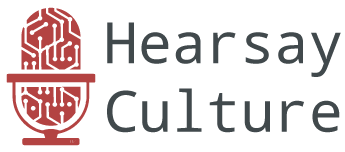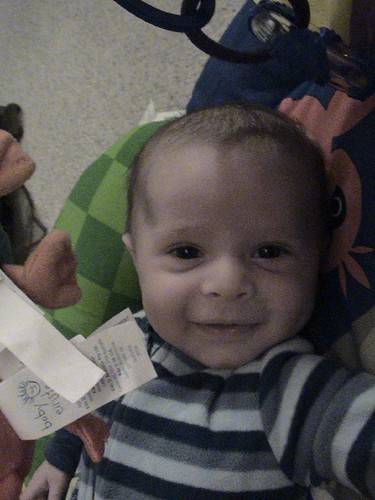I figure that I’ll take my first shot at live-blogging, having been inspired by the Bay Area Blawgers event on Wednesday at Santa Clara [thanks to Prof. Eric Goldman of Santa Clara Law School for setting it up]. The target of this experiment is the conference at MSU Law, “What Ifs and Other Alternative Intellectual Property and Cyberlaw Stories”. I am not a fast enough typist to cover everything, so the disclaimers (and as a litigator, there must always be disclaimers) are that I am not covering everything (or indeed every talk), and may not even hit all of the points raised by the speakers. This is also stream-of-consciousness blogging and not a transcript; reflection on my text displaced by the need for speed — what is live-blogging if I post it a day later (is an hour too long?) So any and all misrepresentations of any points raised are my fault, and I specifically blame myself for never taking a typing class. Finally, I am skipping the names of the speakers for brevity’s sake; they are not nameless professors, of course, and you can find all of their names on the conference webpage. Enough caveats and disclaimers for you? Enough to undermine the exercise’s usefulness perhaps, but my live and published experiment is about set to begin.
Before this, I should add a humorous note. Prof. Peter Yu, the host of the conference, is using his computer to monitor time (which will make it much easier for moderators like me). His computer verbally announces a two minute warning, and at the end of each speaker’s time, says “Your time is up. Please stop.” Hearing a machine voice order humans to stop speaking and communicating with each other — and those humans actually following the command — is humorously unsettling.
The first panel is discussing “Free Speech, Privacy and Virtual Reality.” The antecedents of the right to privacy are discussed, raising the question of whether Samuel D. Warren’s daughter’s nuptuals impacted its development; the conclusion: privacy right would have developed regardless of these events. Virtual reality and its augmentation is discussed next — the question of “virtual occlusion” and the repurcussions of such actions (like what I’m doing right now) in the real sphere. Can one opt out of tech progress? “Wikiality” — a new word for me — is introduced. What if people could post data on your real space, like your house? This is happening in flickr, where people can mark pictures loaded onto a page. So, like much of IP law, the question turns to control. Who (or what) is to control when the “virtual displaces the real?” [I’d say, ask Linden — how far can the code go?] Lastly, what if Congress and Supreme Court were tech-savvy in 1995? It is suggested that the explosion of pornography on the Internet would have been impeded were these entities more sophisticated at the time. The courts’ description of the Internet has influenced its creation.
Next up is patents, which is in the unfortunate position of following a discussion on porn from the previous panel [alas, logistics prevented live blogging of that first talk]. First what-if: what if patents were not published? Publishing is a great source of prior art, but the concern is the content of the patents. We need incentives for applicants to include more non-patent references. Finding references outside the patent system would be a useful outcome. What is the role of patents as prior art? Create network that allows for greater disclosure. [A lack of all relevant info such as to allow for full evaluation of patent applications is a concern, as is transparency in IP].
Business method patents is discussed next. Are “user innovators less likely to need patent incentive to invent?” They are more likely to invent based upon first-mover advantages. What if there was a business method use exemption? Benefits: (a) focuses on concern about exclusive control, (b) neutralize trivial patents; con: more trade secrecy?
Here’s an interesting question, next: what if the GPL (w/o royalties, allow derivatives, provide source code, licensing under GPL) has been patented? Could not have been done in 1991, because no business method patent regime. This is the only impediment to its patentability in 1991. But in fact there are patent applications for GPL licensing, but none have issued thusfar. Biotech is next: Patenting seed has not incentivized innovation. Development of new seeds has happened for many reasons, and patenting is just one. Lastly, what if economists ran the PTO (they don’t?) Economists at FTC are encouraging similar reforms to system as Jaffe & Lerner in Innovation and Its Discontents [note: I just interviewed Josh Lerner; show will be posted very soon]. FCC economists have done well importing “ivory tower theory” into policy. Auctioning spectrum worked; and they thought about the type of auction, fighting collusion. “PTO has barred the doors to economists.” Academic economists are barred, because they are a “threat to their way of life.”
Last patent presentation: “What if Joe Meigs Wrote the Non-Obviousness Statute?” Few in the room, including me, know who Joe Meigs is. Sec. 103(a) is vacuous; indeed, the last sentence protects dumb luck, obviousness is not explained (i.e., you figure it out). Here’s a statement to help us with obviousness: “The best test of what persons of routine ingenuity can do is what they have done.” (Automatic Devices Corp. v. Cuno Eng’g Corp., Hand, J.) Who is Joe Meigs? He proposed, in 1948 to Congress, that obviousness is a question of fact, proof of non-obviousness is found if, among other conditions, it fills a long-felt want. Advantages: it encourages people to fill long-felt wants, defy conventional wisdom in the art. Not-hindsight prone, and encourages stronger narratives that would be pulled into the “long-felt wants” story. But Meigs did not author 103(a).
OK, well now its time for lunch. I am moderating the copyright panel after lunch, so I won’t be blogging for a while. Hope this is useful!











